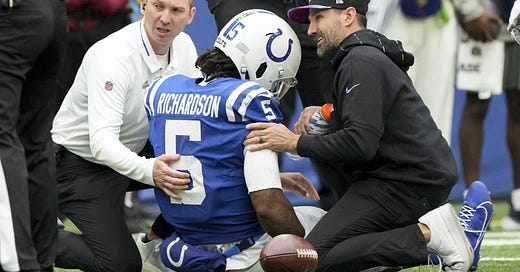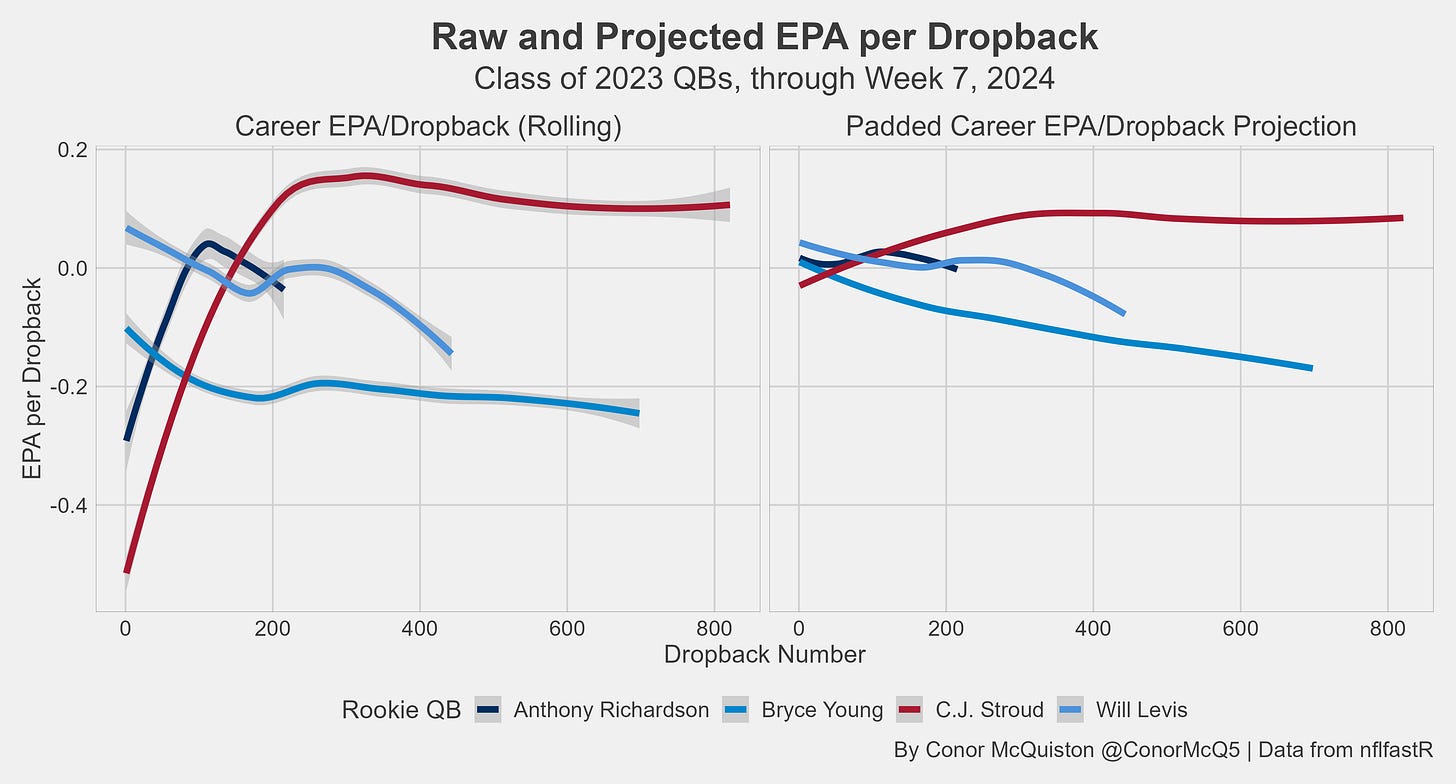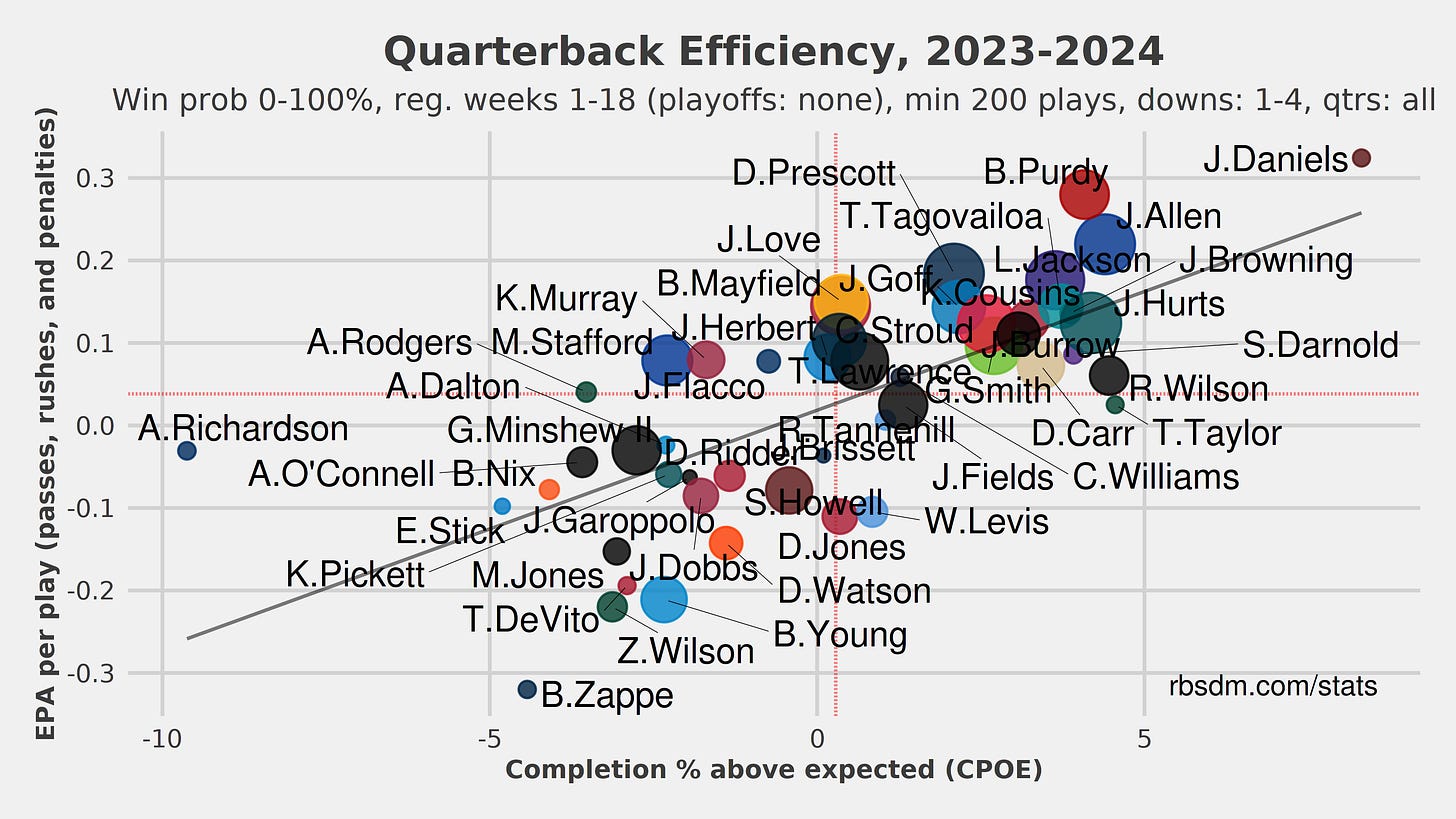We Should Be Concerned About Anthony Richardson
He has all the tools in the world, but he has yet to put it to together to an alarming degree.
At time of writing, 215 dropbacks into his career, Anthony Richardson has the production profile of a less accurate, more oft-injured Will Levis. This is not where the uber-talented former #4 overall pick nor the Colts wanted him to be midway through his second season. While this overall production is not catastrophic so early in his career, it becomes alarming when we also consider his considerable accuracy issues and injury history.
Using the padding method we discussed when looking into Jayden Daniels’ hot start, we can get a better forward-looking idea of how productive he’s been on a per-dropback basis so far.
In both raw EPA/dropback and his career projection with the padding approach, Richardson is essentially identical to Levis at the same point in their careers. The comparison to Levis is intentionally unflattering but its worth noting that having an EPA/dropback around 0 this early on is not a death sentence. Andy Dalton, Jordan Love, Jason Campbell, and Jay Cutler are some serviceable to good QBs who started off in the same universe. It’s not like he’s Bryce Young.
Richardson’s silver lining for his underwhelming production is that it is still early on. My own research found that QBs become the main driver for their EPA/dropback projection once they reach 272 dropbacks. So why raise the alarm bells now and not in a couple weeks? There are two major concerning factors underneath the hood: accuracy and injuries.
Richardson has been the least accurate passer in the NFL since entering the league in 2023. According to RBSDM, he has accumulated a -9.6% CPOE which is the worst in the league and twice as bad as the next closest passer with at least 200 plays (Easton Stick, -4.8%). It doesn’t get any better if we disregard more advanced metrics. He has completed 50% or fewer of his passes in 5 of the 8 games he has thrown more than 10 passes since 2023. That’s tied for the most in the NFL over that span with Zach Wilson - who had 12 qualifying games.
Granted, CPOE specifically has a long stabilization time - the padding method suggests around 315 pass attempts - so he still has time to turn it around. Hell, he is even in the same ballpark as “you have to bring me up every time a toolsy young QB is inaccurate” Josh Allen at this same point (-10.4%). But when a player’s biggest issue coming out of college was his accuracy, and he has become the largest negative outlier with that single biggest issue, it is reason for concern.
So when you have an athlete like AR with his accuracy issues, what does a realistic productive future look like?
His accuracy progresses to a point of being Normal Bad (around -3% to -5% CPOE) OR
He builds the plane out of deep passes and scrambles
Without projecting outlier improvement in the accuracy department, and seeing how the current season is going, option 2 seems like the most likely solution to his woes. Unfortunately this path forward, or any path really, becomes significantly more difficult to accomplish when a player is not on the field.
Richardson has already missed over half of the games in his career due to various injuries. He left midway through his 2nd career game with a concussion and missed a week. He then sprained the AC joint on his throwing shoulder during Week 5 of his rookie year and missed the rest of the season. This season he has already missed the better part of 3 games thanks to a hip sprain. It goes farther back too, getting a procedure on his knee meniscus in December 2021. It is a fool’s errand to predict future injuries, however it is absolutely of particular concern when a QB whose most efficient play style requires him to stay in the pocket for longer and expose himself to open field tackles.
So yes, Richardson is still young. He’s only 22 years old and has attempted fewer than 200 passes in his NFL career after playing 24 games in college. There is a chance he can improve massively and make this whole post seem very silly. The potential is there. However, at present he has had underwhelming overall production on the back of league-worst accuracy and a significant injury report with a play style that almost requires an increased injury risk. He is not yet at a crossroads, but at the current rate he is hurtling towards that point at breakneck speed.
If you enjoyed this post, please subscribe so that you can receive emails updating you upon every post and share this with others who you think might enjoy. This is a free newsletter, but if you are feeling so generous you can buy me a coffee.






It's become quite clear with his unfathomably bad accuracy that Anthony Richardson was not ready for the NFL as a passer. I looked up his college CPOE, just for fun, and it's also verging on the negative double digits, so he wasn't ready for the college level as a passer either, so why did this man get drafted so highly?
Elusiveness.
Pocket presence is an impossibly difficult thing to teach, and it's the most important skill a QB can have. Avoiding sacks and extending plays is the number one duty for a QB, and if you can do it, your ceiling is infinitely higher than every other QB in the game that can't. The most elusive QB in NFL history (evidenced by being the career leader in sack rate) is Peyton Manning. Peyton was not athletic, but he was elusive, and that constantly allowed him the extra second to find the open man. This was the skill that gave him a real argument for being the best QB in NFL history. Number two most elusive? Dan Marino, who is in the same conversation for the same reason.
Anthony Richardson is also fantastic at this. Not as elusive as Peyton Manning (nobody in NFL history is as elusive as Peyton Manning), but a 3.81% sack rate will absolutely do the trick, so he's got the most important skill down already. However, while a QB's feet are their most important asset, they still have to have the arm to come with it, or they will never be anything in the NFL, and as of right now there haven't been many QBs in NFL history with a less productive arm than Anthony Richardson's.
Funnily enough given the comparison you used, Anthony Richardson is the exact opposite of Will Levis in every way. Will has an NFL calibre arm, demonstrated by CPOE values well above zero for his young career, but does not have NFL calibre feet, boasting a career sack rate over ten percent so far. Will has the second most important skill (arm talent) down, but cannot master the most important (sack avoidance), meanwhile Anthony Richardson doesn't even have college level arm talent, but has elite feet. If you could combine these two players (Levis's arm with Richardson's feet) you would have the best QB in the NFL, but as of right now, neither of them are NFL calibre players.
If Anthony Richardson could get his CPOE to zero, he could have a productive NFL career. It's a question of whether you think he can learn how to throw with even average NFL accuracy. I personally do not, so I think he has very little chance to succeed at the NFL level, even while being elite at the most important thing to be elite at, but I suppose it's always possible that he can, but is this a better bet than trying to teach Will Levis pocket presence? I'm not sure.
The two great Draft myths of the current NFL are "flashes" and "coaching up." The utter foolishness of these recent trendy beliefs are now being proven by Richardson and others.
What makes someone valuable as a talent - in any profession, occupation, or skill - is consistency and sustainability of performance over time, and not an occasional outlier performance. Consistency and sustainability are attributes of a repeatable skill and not the occasional performance or good fortune. Anyone can have a great month, year, game, or play...but who consistently exceeds the bar on production and expectations has real skill and talent.
"Flashes" are how the charlatans comprising today's NFL Draft punditry class cover for the obvious gaps and challenges in a prospect they have fallen in love with and are committed to selling you on like some bottle of elixir from the back of a covered wagon...."what a freak athlete and he's shown flashes of being a downfield thrower too!" - or the more cautious sandbagging version - "whoever drafts this guy will need to have patience and the right system, but if they do, they are getting a guy who has off the charts athleticism and already has shown flashes as a passer too!"
Claims of "flashes" from the Draft punditry class (and the endless ESPN highlight loops that accompany them) are the antithesis of consistency, and are the NFL's Greek Sirens calling you into the rocks. See, claims of flashes are in truth huge red flags.
Take Richardson. His poor collegiate passing numbers were in plain sight. None of it mattered as long as you dutifully noted in lockstep with all the other evaluators that he has shown flashes and deserved to "rocket up Draft lists" despite his poor collegiate passing because of his "rare athleticism." Incredibly, we were told that his poor collegiate throwing numbers reflected growing maturity - they showed he was taking care of the ball by throwing it away.
The Colts somehow guzzled all of it on Draft night, and their fans now clamor for Flacco - as in THAT Joe Flacco by the way - to start.
Beyond flashes, the Draft pundits were clear that whatever Richardson's large deficiencies in skills as a passer, they all could be "coached up" once in the NFL. It's a phrase you hear throughout the League and media with increasing frequency these days around rough-edged prospects. Except that later coaching up rarely happens in real life - anywhere.
The higher the level of performance needed in any profession or occupation, the more trained and ready a prospect needs to be to succeed – not less. This is because the higher you go in terms of competition in your chosen field, the more the ecosystem presumes you are closer to a finished product...and the less prepared that ecosystem is to make you a finished product. Training in core baseline functions should be taking place at lower levels of development, and performers at higher levels must be more accomplished coming in to get past the gates.
Outside of the NFL, you know this to be the case. Consider your reaction upon hearing that the mediocre violinist in the community orchestra is going to try and play with the London Philharmonic Orchestra because the Maestro there is particularly good at violin; or when your neighbor tells you that their kid with a “C" average in high school physics will excel in physics at Stanford because the professors there are just such great teachers.
So, how much do you really believe in coaching up? The Colts need to know...and quickly.